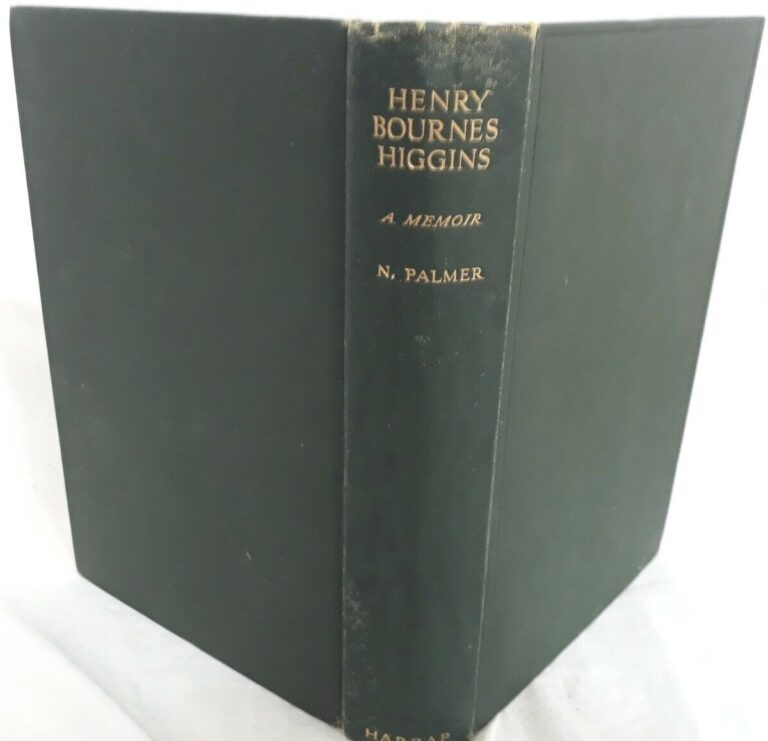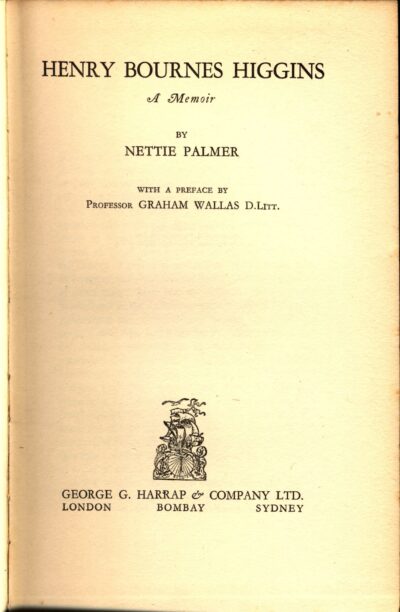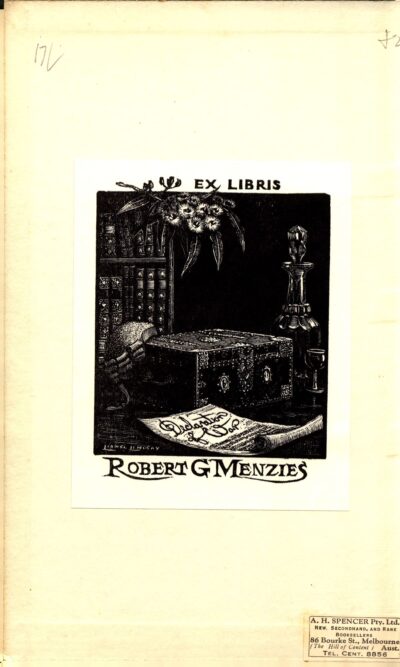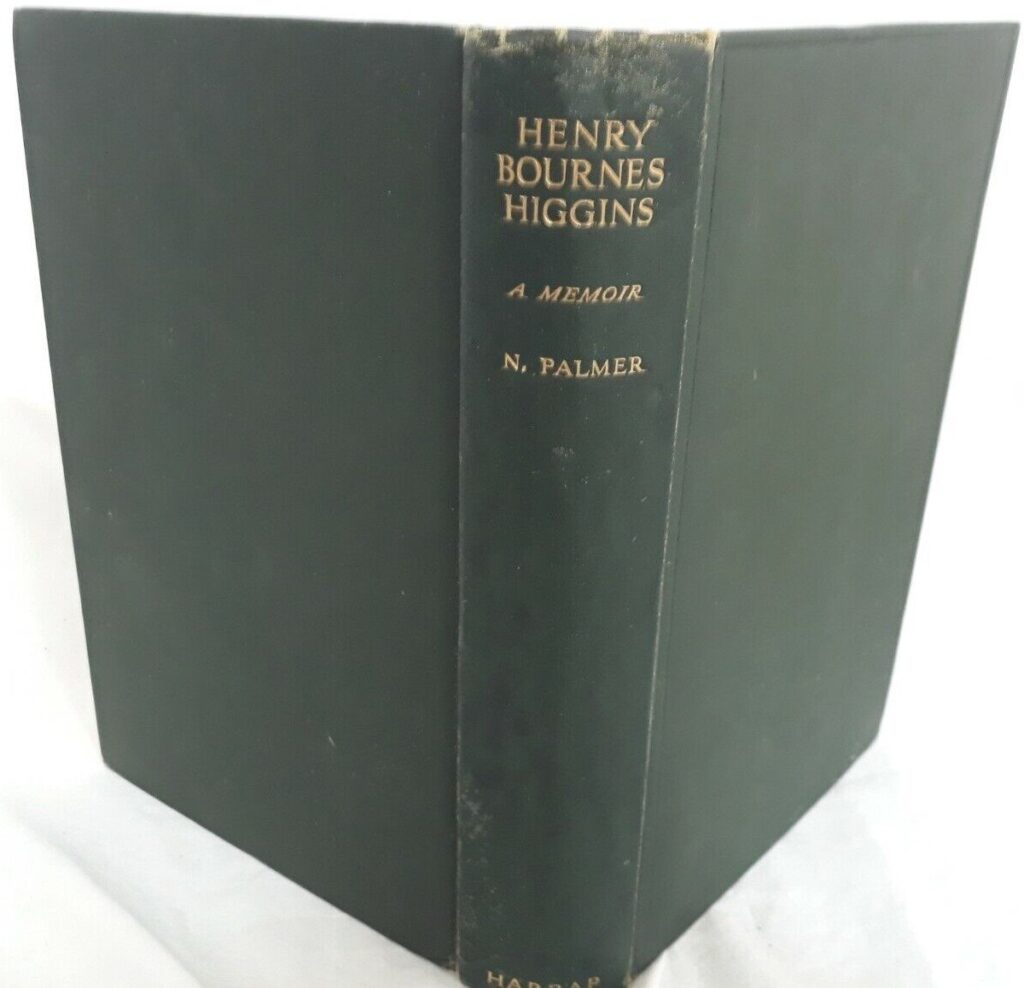Nettie Palmer, Henry Bournes Higgins: A Memoir (1931)
Janet Gertrude ‘Nettie’ Palmer (née Higgins) was an Australian poet, essayist and leading literary critic, who was famous in her own right but who also happened to be the niece of High Court Justice Henry Bournes Higgins – a central figure in the creation of Australia’s industrial arbitration system who delivered the famous ‘Harvester Judgement’ establishing a ‘living’ or minimum wage.
It was due to this family connection that Palmer came to write the first biography of Higgins, published shortly after his death in 1929. The book relates how Higgins was born in 1851‘into an Ireland worn down by famine and depleted by enormous emigration’. His parents were of modest means, and went to great sacrifices to send Henry to boarding school in Dublin, where he developed a lifelong passion for classical literature. Emerging from the ‘boy-prison’, Higgins was in very bad health, and the death of his elder brother who had returned mortally ill from New York determined the family to emigrate, for health’s sake, to Australia.
Arriving in 1870, Higgins earned a living as a teacher whilst studying arts and law at the University of Melbourne. His entry into politics came on the back of the campaign for Irish Home Rule, and in 1894 Higgins was elected to the Victorian Parliament before serving as a delegate to the conventions which drafted a constitution for a federated Australia. There he represented a vocal minority, and he ultimately campaigned against federation because he felt that the Senate was undemocratic for making a miner’s vote in Kalgoorlie worth six times as much as that of a fellow-miner in Broken Hill, and also because he felt the Constitution was too rigid and ‘indissoluble’.
Elected to the Federal Parliament as a member of Alfred Deakin’s Protectionist Party, Higgin’s views were sufficiently radical that he was enlisted to become Attorney General in the short-lived Watson Labor Government. In 1906 Alfred Deakin appointed Higgins to the High Court along with fellow vocal critic of the Constitution Isaac Isaacs, and the two men would ultimately be able to use High Court judgements to manipulate the Constitution to function more in line with their beliefs, despite the fact that constitutional referenda pushing in the same direction were repeatedly rejected by the Australian people. In 1907 Higgins was also made President of the Commonwealth Court of Conciliation and Arbitration, which he hailed as ‘a new province of law and order’.
Higgins was thus an important architect of what would later be dubbed the ‘Australian Settlement’, key policies laid down in the first decade of the Commonwealth’s existence which would remain in place for much of the 20th century. Menzies would famously leave this infrastructure in place, though David Kemp has argued that in several respects he worked to erode and undermine things like the White Australia Policy.
In regards to arbitration, Menzies was primarily concerned with getting unions to obey the rules of the existing system, rather than critiquing that system. He repeatedly quoted Higgins on the ‘new province’ in both his Forgotten People Broadcasts and during the 1946 election, arguing that the arbitration system had been vigorously defended by the Australian people at the 1929 election where Prime Minister Stanley Bruce lost his seat. Menzies passionately believed that illegal strikes, which the Labor Government allowed to go unpunished, undermined the rule of law and general respect for the law:
‘It is the very basis of civilisation that when you appeal to and rely upon the Law you abandon the primitive remedy of force and violence… If it be a stupid folly to strike instead of going to arbitration, the how much worse than folly is it to strike against the decision that the Law, speaking through the Industrial Judge, has made. To defy the Law is undemocratic; more, it is sheer anarchy… I have seen hundreds of men and women at football matches to whom Saturday afternoon was simply an opportunity of cursing and abusing the umpire from a safe vantage-ground outside the rails. It is these people who are of the stuff which the promotors of war-time strikes are made, and the pity is that so many decent people should be misled by them’.
Menzies had another connection to Higgins revealed in the Menzies Collection, for his copy of T.M. Cooley’s Constitutional History of the United States as Seen in the Development of American Law (1890) has an inscription that suggests that it was originally owned by Higgins. Menzies appeared before Higgins in the High Court many times, and the judge’s outspoken views with regard to the Constitution undoubtedly played an important role in Menzies’s victory in the Engineers’ Case.
You might also like...
Sign up to our newsletter
Sign up for our monthly newsletter to hear the latest news and receive information about upcoming events.





